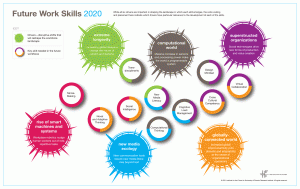The concept of work is getting re-worked. All this change establishes a new norm. The skills required to get and keep a job are changing dynamically and continuously. Individuals seeking good paying jobs will need to develop and maintain skill sets not for just one lifelong career but skills transfer to multiple and sometimes simultaneous careers.
Tom Friedman in a recent New York Times editorial hit the proverbial nail on the head:
In the past, workers with average skills, doing an average job, could earn an average lifestyle. But, today, average is officially over. Being average just won’t earn you what it used to. It can’t when so many more employers have so much more access to so much more above average cheap foreign labor, cheap robotics, cheap software, cheap automation and cheap genius…Average is over.
Change has always made some jobs obsolete but created new jobs, new products, new services. But the change is happening faster. As a result, we know for sure that with each advance in globalization and the technology revolution, the best jobs will require workers to have more and better education to make them above average.
Unfortunately discussions about education and re-training miss the scope and magnitude about how work and skills needed to do the work are changing.

The IFTF’s recent project with the Apollo Research Institute on the future of work skills describe some of the new work skills required to leverage emerging automation technologies. I’m mentioned several of these skills in previous posts and articles – adaptive thinking, cognitive load management, cross-cultural competency, sense making to name a few. I’ve also mentioned collaboration as a must-have skill going forward. But again, the scope of collaboration is something that most people don’t yet grasp.
When someone mentions collaboration, the immediate image likely projects people working together, teamwork, and cooperative. But this picture of collaboration is based on Industrial Age conditions. This makes collaboration serves as the perfect starting point of a discussion about how work and work skills are changing.
Going forward collaboration is not just a relationship between one human and another but between man and machine. Unlike the John Henry legend where man’s skills challenged the productivity of a steam-hammer or chess champion Garry Kasparov’s brilliance competed against the intelligence of Big Blue, future innovation will depend upon people racing with machines, not against them.
A recent article in The Futurist, Thriving in the Automated Economy, expanded this discussion. The authors believe that the key to winning the race is not to compete against machines but compete with them. You need to look no further than the art and science of data mining to grasp this concept.
Big data is big and only getting growing bigger at a faster pace. For example, man created 150 exabytes of information in 2005. In 2011, it created over 1,200 exabytes of new information. To provide a point of reference, 5 exabytes equals 37,000 new libraries the size of the Library of Congress. By 2013, the amount of traffic flowing over the Internet is expected to exceed 668 exabytes.
This explosion of data is one thing. Competitive edge comes to the organizations who can understand it. The ability to understand it requires analytical skill sets that few people have. Finding a solution requires not only exceptional “making sense” skills but the ability to collaborate with machines. That is why by 2018, the United States alone could be short 140,000 to 190,000 people with the analytical skills necessary to use big data to make effective decisions.
The concept of work is getting re-worked. Collaborative automated systems will blur the line between “tools” and “co-workers” in next few years. The worker with average skills is or will be a low-skill, low-pay worker very soon.
Thriving in an automated economy requires innovative and collaborative skills few of us possess. What are some of trends in work and skills required to do the work you see developing?
Related articles:
What Jobs Should the U.S. Be Creating?
